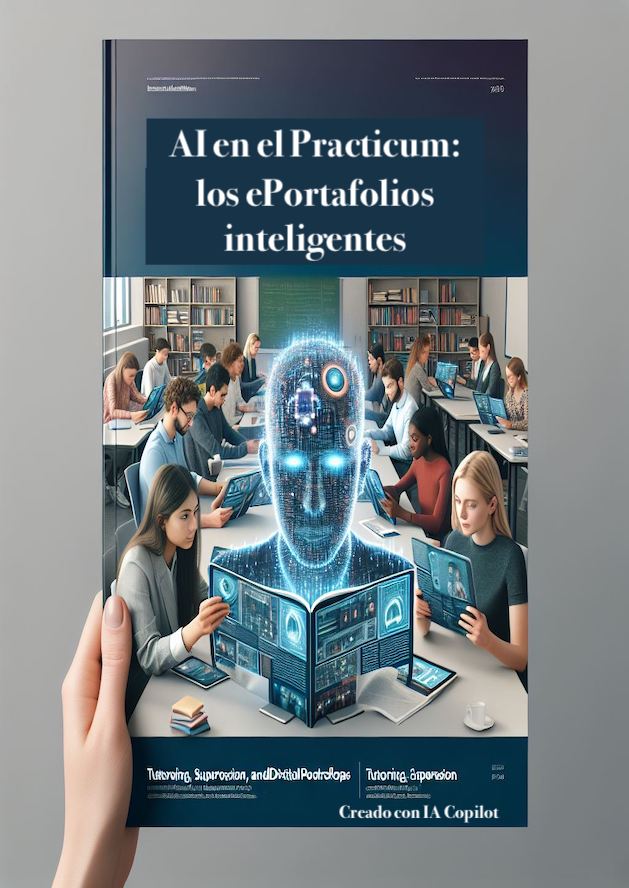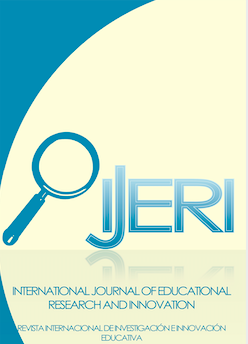Artificial intelligence and its contribution to ePortfolios in the practicum
DOI:
https://doi.org/10.24310/rep.9.2.2024.20495Keywords:
Artificial intelligence, Practicum, Initial teacher education, Reflective practice, Digital portfoliosAbstract
Although numerous experiences have been published on the possibilities of artificial intelligence (AI) in education in general, to date there have been no specific publications or reviews on its application in a subject as particular as the practicum and external placements at university. This paper presents a consolidated model of tutoring, supervision and assessment of digital portfolios in the practicum and TFG of the Education Degree. After presenting the main milestones of the model, the possibilities of using AI in digital portfolios for pre-professional training in real contexts are analysed. The main functions are described, such as the integration of AI in the model, to conclude with the most relevant functions found in its application, especially in reflective diaries.
Downloads
Metrics
Publication Facts
Reviewer profiles N/A
Author statements
Indexed in
-
—
- Academic society
- N/A
- Publisher
- Universidad de Málaga
References
Adams, B., & Wilson, N. S. (2022). Investigating Student’s During-Reading Practices Through Social Annotation. Literacy Research and Instruction, 61(4), 339–360. https://doi.org/10.1080/19388071.2021.2008560
Adams, A. N., Brock, R. J., Gordon, K. A., Grohs, J. R., & Kirk, G. R. (2014). Service, Dialogue, and Reflection as Foundational Elements in a Living Learning Community. Journal of College and Character, 15(3), 179–188. https://doi.org/10.1515/jcc-2014-0021
Bond, M., Khosravi, H., De Laat, M., Bergdahl, N., Negrea, V., Oxley, E., Pham, P., Chong, S. W., & Siemens, G. (2024). A meta systematic review of artificial intelligence in higher education: a call for increased ethics, collaboration, and rigour. International Journal of Educational Technology in Higher Education, 21(1), 1–41. https://doi.org/10.1186/s41239-023-00436-z
Cebrián-de-la-Serna, M. y Cebrián-Robles, V. (2023).Videodiarios reflexivos en el prácticum y su análisiscompartido mediante anotaciones multimedia. Revista Practicum,8(1), 7-18. https://doi.org/10.24310/RevPracticumrep.v8i1.16262
Cebrián Robles, D., Pérez Galán, R., & Cebrián de la Serna, M. (2017). Estudio de la comunicación en la evaluación de los diarios de prácticas que favorecen la argumentación. Revista Practicum, 2(1), 1–21. https://doi.org/10.24310/RevPracticumrep.v2i1.8262
Cebrián-de-la-Serna, M., Bartolomé-Pina, A., Cebrián-Robles, D., & Ruiz-Torres, M. (2015). Estudio de los Portafolios en el Practicum: Análisis de un PLE-Portafolios. RELIEVE - Revista Electrónica de Investigación y Evaluación Educativa, 21(2). https://doi.org/10.7203/relieve.21.2.7479
Cebrián de la Serna, M. (2011). Supervision Using E-Portfolios and Its Impact on Student Reflections during the Practicum: a Case Study. Revista de Educación, 354. http://goo.gl/ULCCas
Ciesielkiewicz, M., Chan, C., & Nocito, G. (2020). ePortfolio and Service-Learning: A Tale of Two Cities Connected by Two High-Impact Practices. International Journal of Emerging Technologies in Learning (iJET), 15(05), 119–139. https://doi.org/10.3991/ijet.v15i05.12087
Debby R. E. Cotton, Peter A. Cotton & J. Reuben Shipway (2023). Chatting and cheating: Ensuring academic integrity in the era of ChatGPT. Innovations in Education and Teaching International, 61(2), 228–239. https://doi.org/10.1080/14703297.2023.2190148
Fisher, M., & Hill, A. (2017). Eportfolio Implementation in a Multiple Campus University Environment. International Journal for Cross-Disciplinary Subjects in Education, 8(2), 3055–3063. https://cutt.ly/gt6sCkY
Forero-Corba, W., & Negre Bennasar, F. (2024). Técnicas y aplicaciones del Machine Learning e Inteligencia Artificial en educación: una revisión sistemática. RIED. Revista Iberoamericana de Educación a Distancia, 27(1), 209–253. https://doi.org/10.5944/ried.27.1.37491
Gallego-Arrufat, M.-J., Torres-Hernández, N., & Pessoa, T. (2019). Competencia de futuros docentes en el área de seguridad digital. Comunicar: Revista Científica de Comunicación y Educación, 27(61), 57–67. https://doi.org/10.3916/C61-2019-05
Guder, C. (2013). The ePortfolio: A Tool for Professional Development, Engagement, and Lifelong Learning. Public Services Quarterly, 9(3), 238–245. https://doi.org/10.1080/15228959.2013.815528
Lawson, T., Çakmak, M., Gündüz, M., & Busher, H. (2015). Research on teaching practicum: a systematic review. European Journal of Teacher Education, 38(3), 392–407. https://doi.org/10.1080/02619768.2014.994060
Lemanski, M., & Venneman, S. (2023). Student Satisfaction with the Perusall Social Annotation Platform. Journal of Educators Online, 20(1). https://doi.org/10.9743/JEO.2023.20.1.19
Moscoso, J. N. (2019). Abductive reasoning: a contributation to knowledge creation in education. Cadernos de Pesquisas, 49(171), 308–329. https://doi.org/10.1590/198053145255
Pérez-Torregrosa, A.B., Romero-López, M.-A., Ibáñez-Cubillas, P., & Gallego-Arrufat, M.-J. (2017). Grado de satisfacción, utilidad y validez de la evaluación con rúbricas electrónicas durante el prácticum. Revista Practicum, 2(1), 60–79. https://revistapracticum.com/index.php/iop/article/view/25
Pradana, M., Elisa, H. P., & Syarifuddin, S. (2023). Discussing ChatGPT in education: A literature review and bibliometric analysis. Cogent Education, 10(2), 2243134. https://doi.org/10.1080/2331186X.2023.2243134
Rapanta, C. (2018). Teaching as abductive reasoning: The role of argumentation. Informal Logic, 38(2), 293–311. https://doi.org/10.22329/il.v38i2.4849
Raposo-Rivas, M., & Martínez-Figueira, E. (2018). ¿Tecnologías emergentes o tecnologías emergiendo?: Un estudio contextualizado en la práctica preprofesional. Educar, 1. https://doi.org/10.5565/rev/educar.888
Regalado, O. L., Núñez-Rojas, N., Gil, O. R. L., & Sánchez-Rodríguez, J. (2024). Analysis of the use of artificial intelligence in university education: a systematic review. Pixel-Bit. Revista de Medios y Educación, 97–122. https://doi.org/10.12795/pixelbit.106336
Ruiz-Rey, F. J., Cebrián-Robles, V., & Cebrián-de-la-Serna. (2021). Redes profesionales en tiempo de Covid19: compartiendo buenas prácticas para el uso de TIC en el prácticum. Revista Practicum, 6(1), 7–25. https://doi.org/10.24310/RevPracticumrep.v6i1.12283
Sabry, F. (2023). Abductive Reasoning: Fundamentals and Applications. One Billion Knowledgeable.
Swartz, R. J., Costa, A. L., Beyer, B. K., Reagan, R., & Kallick, B. (2020). El aprendizaje basado en el pensamiento: cómo desarrollar en los alumnos las competencias del siglo XXI. SM.
Wilson, C. B., Slade, C., & Kirby, M. M. (2018). Digital Ethics and the Use of ePortfolio: A Scoping Review of the Literature. International Journal of ePortfolio, 8(2), 115–125. http://www.theijep.com/pdf/IJEP306.pdf
Yan, D. (2023). Impact of ChatGPT on learners in a L2 writing practicum: An exploratory investigation. Education and Information Technologies, 28(11), 13943–13967. https://doi.org/10.1007/s10639-023-11742-4
Zabalza-Beraza, M. A. (2016). El Practicum y las prácticas externas en la formación universitaria. Revista Practicum, 1(1). https://doi.org/10.24310/RevPracticumrep.v1i1.8254

Downloads
Published
How to Cite
Issue
Section
License
Copyright (c) 2024 Manuel Cebrián-de-la-Serna, Ana-Belén Pérez-Torregrosa (Autor/a)

This work is licensed under a Creative Commons Attribution-NonCommercial-ShareAlike 4.0 International License.
Acceptance of the work implies that the author grants Revista Prácticum the exclusive rights to reproduce, distribute and sell his or her work worldwide, both in digital and paper formats, CD-ROM, etc.
Likewise, the authors shall grant Revista Prácticum the rights of dissemination, public communication on the Internet and IT networks, data buses, as well as any other portals or electronic devices for online consultation of its contents and extracts, under the conditions of the portal, repositories or databases where the work is stored.
Revista Prácticum allows authors to publish and disseminate their articles and works on their personal websites, research teams, institutional repositories and scientific databases. All this in accordance with the Creative Commons 4.0 License









8.png)








